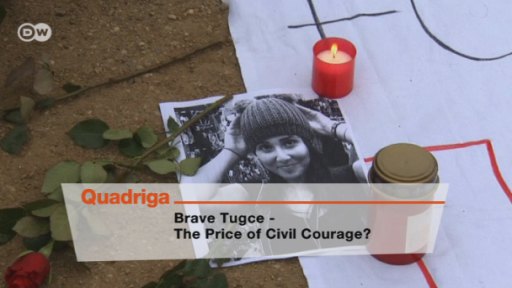Quadriga - Brave Tugce: The Price of Civil Courage?

This browser does not support the video element.
On November 28, after doctors pronounced her brain dead, the life-support system she was on was disconnected. It was her 23rd birthday.
German President Joachim Gauck praised Tugce for showing civil courage in a situation in which others would rather look the other way. Tugce had herself become the victim of a brutal crime and would, he said, always remain as a role model.
But is it always the right thing to do to step into disputes? Does this idea encourage people to take unnecessary risks with their own safety? How should society counter the problem of violence? Should the state play the major role in providing security? What is the responsibility of the individual?
There was a similar public debate in Germany in 2009 following the murder of fifty-year-old Dominik Brunner. He was beaten to death after stepping in to protect two children. In 2012 Jonny K. was killed by youths after trying to mediate in a conflict situation on Berlin’s central Alexanderplatz.
Such cases awaken fears as to the consequences of showing civil courage. Will the high profile coverage in this latest case cause people to be more cautious? Or awaken the courage that is in all of us? Why don’t more people stand up against violence and discrimination? What would life be like in a society where no-one is prepared to help out or show solidarity with others?
Tugce’s own civic commitment was underlined when it was revealed she was registered as an organ donor. Her tissues will now save a number of lives of people in urgent need of a transplant.
Brave Tugce: The Price of Civil Courage?
Tell us what you think: send an e-mail to quadriga@dw.de
Our guests:
Malte Lehming– is the editor of the opinion page of "Der Tagesspiegel", he was the paper's Washington Bureau Chief from January 2001 to July 2005. Lehming joined "Der Tagesspiegel” in 1991 as a foreign editor, covering security issues, transatlantic relations and the Middle East. From 1989 to 1991, he served as personal assistant and speechwriter for the former German Chancellor Helmut Schmidt. Lehming completed an MA in philosophy, German Literature and European History.
Judy Dempsey- After training as a journalist in Ireland, Ms Dempsey embarked on an international career: From the 1980s to early 1990s she reported from eastern Europe. In 1996 she took over the Financial Times' bureau in Jerusalem where she remained until 2001. Judy Dempsey has won numerous awards for her work, including the Anglo-German Prize and the Foreign Press Association Award. She was a Columnist for the International Herald Tribune and works now as a Senior Associate at Carnegie Europe and editor-in-chief of Strategic Europe.
Martin Gak- received - his Ph.D. in philosophy from The New School for Social Research in New York. His area of work is ethics in theory and practice. He wrote his dissertation on the relation between religious morality and secular ethics and the grounds of politics. Based in Berlin, he is a regular contributor to newspapers, magazines and blogs.